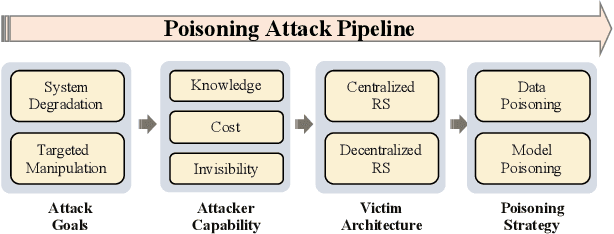Poisoning Attacks and Defenses in Recommender Systems: A Survey
Paper and Code
Jun 03, 2024



Modern recommender systems (RS) have profoundly enhanced user experience across digital platforms, yet they face significant threats from poisoning attacks. These attacks, aimed at manipulating recommendation outputs for unethical gains, exploit vulnerabilities in RS through injecting malicious data or intervening model training. This survey presents a unique perspective by examining these threats through the lens of an attacker, offering fresh insights into their mechanics and impacts. Concretely, we detail a systematic pipeline that encompasses four stages of a poisoning attack: setting attack goals, assessing attacker capabilities, analyzing victim architecture, and implementing poisoning strategies. The pipeline not only aligns with various attack tactics but also serves as a comprehensive taxonomy to pinpoint focuses of distinct poisoning attacks. Correspondingly, we further classify defensive strategies into two main categories: poisoning data filtering and robust training from the defender's perspective. Finally, we highlight existing limitations and suggest innovative directions for further exploration in this field.
 Add to Chrome
Add to Chrome Add to Firefox
Add to Firefox Add to Edge
Add to Edge